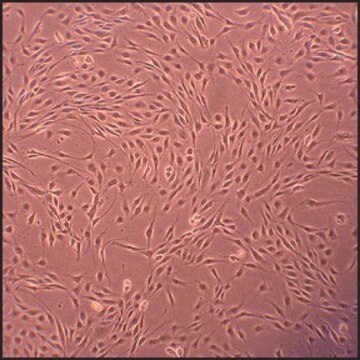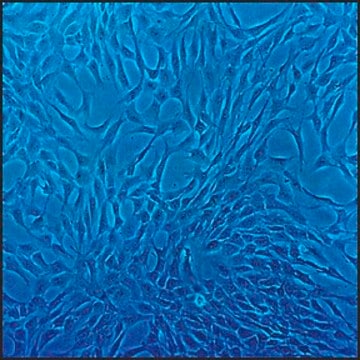CN402-05
Canine Chondrocytes: CnC (Cryovial)
Se connecterpour consulter vos tarifs contractuels et ceux de votre entreprise/organisme
About This Item
Code UNSPSC :
41106514
Nomenclature NACRES :
NA.81
Produits recommandés
Source biologique
canine articular cartilage (normal)
Conditionnement
pkg of 500,000 cells
Fabricant/nom de marque
Cell Applications, Inc
Mode de croissance
Adherent
Caryotype
2n = 78
Morphologie
chondrocyte
Technique(s)
cell culture | mammalian: suitable
Maladie(s) pertinente(s)
arthritis
Conditions d'expédition
dry ice
Température de stockage
−196°C
Description générale
Lot specific orders are not able to be placed through the web. Contact your local sales rep for more details.
Canine Chondrocytes (CnC) are derived from normal canine articular cartilage where they produce and maintain the extracellular matrix of cartilage. Following monolayer culturing, CnC can be grown in alginate microspheres to study chondrocyte proliferation and metabolism in a three-dimensional in vitro system. Alginate microspheres provide more physiological conditions for the chondrocytes and allow them to sustain normal proteoglycans production and retention. Because of the prevalence of degenerative joint disease in geriatric dogs, CnC can be a useful tool for veterinary practice.
Canine Chondrocytes (CnC) were utilized to evaluate anti-inflammatory and anti-oxidant activity of Glyco-Flex III (Yáñez, 2008) and trans-pterostilbene (Remsberg, 2008). They were also used in material studies aimed to develop optimal surfaces/scaffolds for engineered tissues, cellular arrays, biosensors and lab-on-chip devices (Wright, 2012; Shaik 2013a,b).
Canine Chondrocytes (CnC) are derived from normal canine articular cartilage where they produce and maintain the extracellular matrix of cartilage. Following monolayer culturing, CnC can be grown in alginate microspheres to study chondrocyte proliferation and metabolism in a three-dimensional in vitro system. Alginate microspheres provide more physiological conditions for the chondrocytes and allow them to sustain normal proteoglycans production and retention. Because of the prevalence of degenerative joint disease in geriatric dogs, CnC can be a useful tool for veterinary practice.
Canine Chondrocytes (CnC) were utilized to evaluate anti-inflammatory and anti-oxidant activity of Glyco-Flex III (Yáñez, 2008) and trans-pterostilbene (Remsberg, 2008). They were also used in material studies aimed to develop optimal surfaces/scaffolds for engineered tissues, cellular arrays, biosensors and lab-on-chip devices (Wright, 2012; Shaik 2013a,b).
Origine de la lignée cellulaire
Cartilage
Application
production and maintenance of extracellular matrix, cartilage, collagen, differentiation and de-differentiation, signal transduction, apoptosis, differentiation, drug screening, gene expression, cytokine production, agarose assays, chondrocyte adhesion to medical implants, scaffolds for cartilage regeneration
Composants
Canine Chondryocyte Basal Medium containing 10% FBS & 10% DMSO
Notes préparatoires
- 1st passage, >500,000 cells in Canine Chondryocyte Basal Medium containing 10% FBS & 10% DMSO
- Can be cultured at least 10 doublings
Procédure de repiquage
Please refer to the CnC Culture Protocol.
Code de la classe de stockage
11 - Combustible Solids
Classe de danger pour l'eau (WGK)
WGK 3
Point d'éclair (°F)
Not applicable
Point d'éclair (°C)
Not applicable
Certificats d'analyse (COA)
Recherchez un Certificats d'analyse (COA) en saisissant le numéro de lot du produit. Les numéros de lot figurent sur l'étiquette du produit après les mots "Lot" ou "Batch".
Déjà en possession de ce produit ?
Retrouvez la documentation relative aux produits que vous avez récemment achetés dans la Bibliothèque de documents.
Notre équipe de scientifiques dispose d'une expérience dans tous les secteurs de la recherche, notamment en sciences de la vie, science des matériaux, synthèse chimique, chromatographie, analyse et dans de nombreux autres domaines..
Contacter notre Service technique






